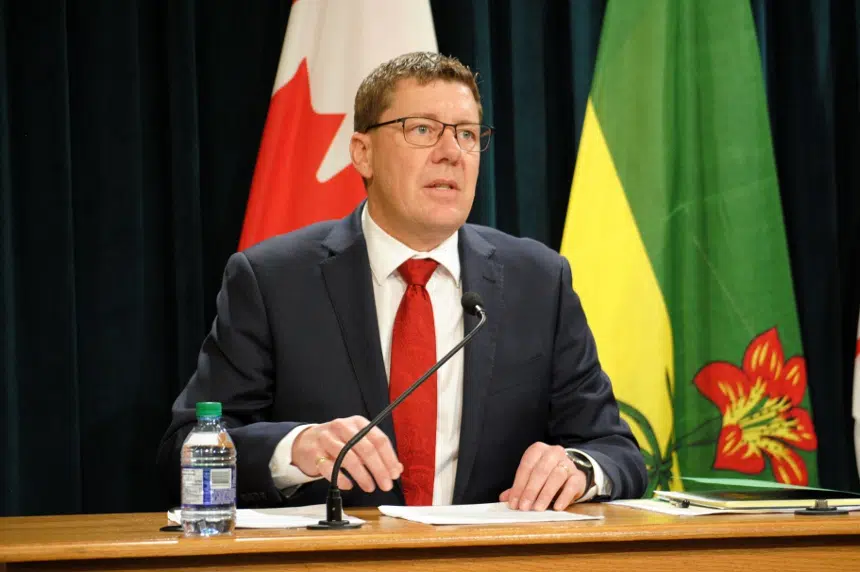A recent spike in COVID-19 cases in Saskatchewan’s far north now includes the region’s first fatality due to the coronavirus.
In a media release Monday, the Government of Saskatchewan confirmed a person in their 80s had died Sunday. Further details weren’t provided, but the government said the person lived in the far north.
On Sunday, the mayor of La Loche said an elder from that community had died.
According to Mayor Robert St. Pierre, the 83-year-old man had been receiving care in North Battleford prior to his death.
“This really underscores our continuing vigilance to remain steadfast to observe all necessary precautions to prevent further transmission,” Dr. Saqib Shahab, Saskatchewan’s chief medical health officer, said Monday during a conference call. “This is especially important as we plan to reopen certain services in the coming weeks.”
The first four COVID-19-related deaths in the province to date were recorded in Regina, Saskatoon, the north and the central region.
The government’s release said there were 12 new cases in the province as of Monday, including 11 in the far north and one in the north. It’s the highest number of cases in a single day since there were 18 on April 5.
There have been 365 cases to date. There weren’t any more recoveries as of Monday, leaving that number steady at 288.
Seventy-two cases are considered to be active, comprising 42 in the far north, 10 in the north, 10 in Regina, seven in Saskatoon, two in the central region and one in the south.
The government said 29 of the cases in the province’s far north are in La Loche and are connected to an outbreak at an oilsands camp in northern Alberta. Dr. Rim Zayed, a medical health officer with the Saskatchewan Health Authority, confirmed that 26 of the cases are the result of travel from Alberta.
“This again shows how quickly COVID can transmit,” Shahab said. “One or two people can generate two or three additional cases. In a week, that can generate two or three additional cases, which is nine. Then if those nine cases generate two or three additional cases, that’s 27 … Within two or three weeks, you can get into the dozens of cases and within five or six weeks, you can get into hundreds of cases.”
On Friday, Shahab issued a public health order restricting all non-essential travel into and out of northern Saskatchewan. Shahab also said non-essential travel between communities within northern Saskatchewan should be curtailed.
During Monday’s conference call, Zayed detailed some of the steps being taken to combat the spread of the virus in La Loche and surrounding area.
More testing supplies are being sent to the region, a new testing machine will be operational by May 1 to reduce the turnaround time for results, and home testing, drive-thru testing and mobile testing units are being used to increase the number of people being screened.
As well, a list of all residents of the area who have returned recently from Fort McMurray has been compiled and those people are being asked to self-isolate.
Zayed stressed that the outbreak in the town is under control.
“We will find new cases; this doesn’t mean uncontrolled,” she said. “This means we (can) anticipate new cases based on the different incubation periods and the different exposure of people and the more testing that we do based on our contact tracing.”
A look at the numbers
The province has recorded more cases in the past seven days (49) than it had in the previous 12 days combined (45).
As of Monday, there were seven people in hospitals across the province, including five — three in the north and two in Saskatoon — who were receiving inpatient care. Two people were in intensive care in Saskatoon.
Of the total number of cases, 149 are contacts of other cases or are linked to mass gatherings, 139 are related to travel, 42 are under investigation by public health officials, and 35 don’t have any known exposures.
There have been 150 cases in the Saskatoon area, 74 in the Regina area, 69 from the north, 46 in the far north, 15 from the south and 11 from the central region.
The total number of cases includes 38 health-care workers.
Demographically speaking, 132 cases are in the 20-to-39 age range, 124 are between the ages of 40 and 59, 68 are in the 60-to-79 range, 30 involve people 19 years of age and under, and 11 are people aged 80 and over.
There have been 28,296 COVID-19 tests performed in the province to date, including 412 on Sunday.
Moe: No discussion on recalling legislature
Opposition Leader Ryan Meili said Friday he wants the legislature recalled to ensure democratic oversight of the government’s handling of the pandemic.
That possibility has not yet been discussed by the Saskatchewan Party.
“All of our resources at this point in time have been focused on addressing the health-care delivery of the COVID crisis,” Premier Scott Moe said during Monday’s conference call. “(We’re) addressing how we are working with our communities to ensure that we have the proper and appropriate testing in place (and) contact tracing.”
Moe said the work done in the legislature and in committees must resume in some form at some point, but the government simply hasn’t discussed when or how to do that.







